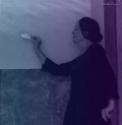| Título | Home-specific Performance and the Digital Staging of the Domestic in Flanker Origami |
| Tipo de publicação | Journal Article |
| Year of Publication | 2023 |
| Autores | Mastrominico, B |
| Journal | International Journal of Performance Arts and Digital Media |
| Start Page | 2 |
| Date Published | July 2023 |
| Publisher | Routledge - Taylor & Francis Group |
| Type of Article | Research Article |
| Publication Language | English |
| Palavras chave | digital performance, home-specific performance, New technologies, online theatre, practice research |
| Abstract | This paper discusses home as a stage and its intersection with new technologies through an autoethnographic recollection and analysis of practice research, whose processes and methods are entangled with both digital and domestic environments on the virtual stage of Flanker Origami, a live online performance on Zoom devised by Organic Theatre. Premiered as part of the digital programme of the Edinburgh Festival Fringe 2021, the performance is discussed as a case study of shifts in practice driven by the COVID19 pandemic in the real home of the two devisers/performers. This enquiry introduces and discusses home-specific performance as a practice research methodology, which exploits the deep nexus between home, identity and gender in the digital staging of the domestic in Flanker Origami. Analysing online training, hybrid scenography and digital performativity specific to the performers’ home, this practice-based investigation evaluates the benefits and challenges of developing online theatre in a situation of social confinement. The conclusion evidences that home as a digital stage was instrumental in reconfiguring notions of self and authenticity in performance processes driven by the pandemic, while creatively reframing the familiar and the domestic to expand and innovate artistic practice at a critical point of social and personal vulnerability. |
| Notas | Open access |
| URL | https://www.tandfonline.com/doi/full/10.1080/14794713.2023.2239693 |
| DOI | 10.1080/14794713.2023.2239693 |
There are currently 0 users online.
Site's last update: 10 horas 42 minutos atrás






Comentários
Supported by Queen Margaret
Supported by Queen Margaret University through a Centre for Communication, Cultural and Media Studies research grant.
My latest article
Open access on the International Journal of Performance Arts and Digital Media